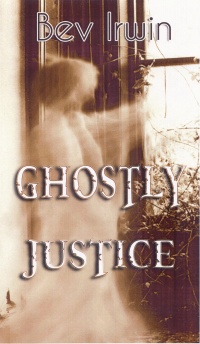| ________________
CM . . . . Volume XVIII Number 40. . . . June 15, 2012
excerpt:
In Ghostly Justice, Bev Irwin successfully blends three popular genres: the ghost story, the detective story and the teen problem novel. She opens with the voice of a ghost, Amanda, looking out a window at two teenage girls. One looks up and shudders. This is the sign Amanda has been waiting for. Here is someone with the capacity to see and hear her. Following this prologue, Daria Brennan takes over the story as first person narrator. The 15-year-old student, daughter of a needy, boozy mother, feels sad, overburdened, unattractive and unpopular. Worse, she has a special sensitivity to vibes and atmospheres; indeed, she can often read people's minds and sense their feelings. In Alex, a classmate, she senses a sadness as profound as her own.Passing the old Morrison mansion on her way to and from school, Daria sees a face in the window, though she knows that the only occupant, an elderly woman, is in hospital for a long term stay. Near the house she feels chills, hears whispers, and smells lilacs in September! At school, Daria and her best friend, Tracy, win the friendship of Alex and Bryce. One afternoon, when they have no place to hang out, Tracy, Alex and Bryce decide to break into the Morrison house. Daria objects, then reluctantly goes along. Inside, while exploring the rooms of expensive, old-fashioned furniture, she feels weak and cold, then perceives the image of a girl in a mirror a girl who is neither herself nor Tracy. Later, at home, a voice inside Daria's head says, "You're the only one who can help me." In Daria, Irwin has created a distinctive, admirable character. Daria's sense of humour is shown in a scene with the school guidance counselor where she blurts, "I can talk to dead people." Quickly she amends it to: "I can talk to people." Later, she scolds herself: "I can talk to dead people. Do they offer a degree in that? Oh, yes, dear, they... have a Theatre of the Insane Arts." When Amanda fully materializes, she asks that Daria bring to justice the person who murdered her in 1972. Using internet research and legwork to supplement her psychic powers, Daria finds evidence to convict the perpetrator. A trip to the cemetery, exploration of the creepy basement in the hold house, and a flight through the woods are just some of the events filled with tension and terror which culminate in hand to hand combat with a killer. Irwin's tension loaded sentences make readers bite their nails. Daria's home life is a "teen problem novel" as compelling as the ghost and detective plots. In the guidance office, Daria tells the counselor that she wouldn't make a good nurse, but doesn't elaborate.
Daria's mother is susceptible to smooth charmers, such as mayoralty candidate Richard Gilbert on TV. While Mom drools over him, Daria sees him as a "viper." Mom's latest boyfriend, Arlen, smells like "decay" to Daria. "His soul was dark and I felt repelled by him," she says. Events prove that her impressions are accurate. Two interesting elements in the novel are not fully developed. Daria's encounters with Selena, the school beauty, serve the plot, but the potentially gripping story of her romance with Alex's brother in "juvie" is mentioned but not presented. Similarly, Daria mentions her "crazy" aunt who runs an antique shop, but the aunt is not used in the novel. Perhaps these elements were cut for length reasons. Will they blossom in future novels with Daria as narrator and psychic sleuth? Let's hope so.Highly Recommended. The past haunts the characters in Ruth Latta's latest novel, The Old Love and the New Love (Ottawa, Baico, 2012), but only figuratively.
To comment
on this title or this review, send mail to cm@umanitoba.ca.
Copyright © the Manitoba Library Association. Reproduction for personal
use is permitted only if this copyright notice is maintained. Any
other reproduction is prohibited without permission.
NEXT REVIEW |
TABLE OF CONTENTS FOR THIS ISSUE
- June 15, 2012.
AUTHORS |
TITLES |
MEDIA REVIEWS |
PROFILES |
BACK ISSUES |
SEARCH |
CMARCHIVE |
HOME |
||||||
